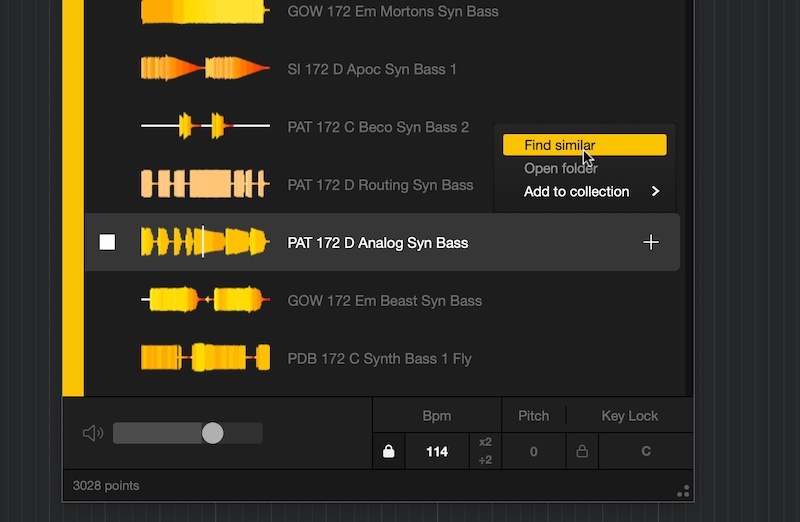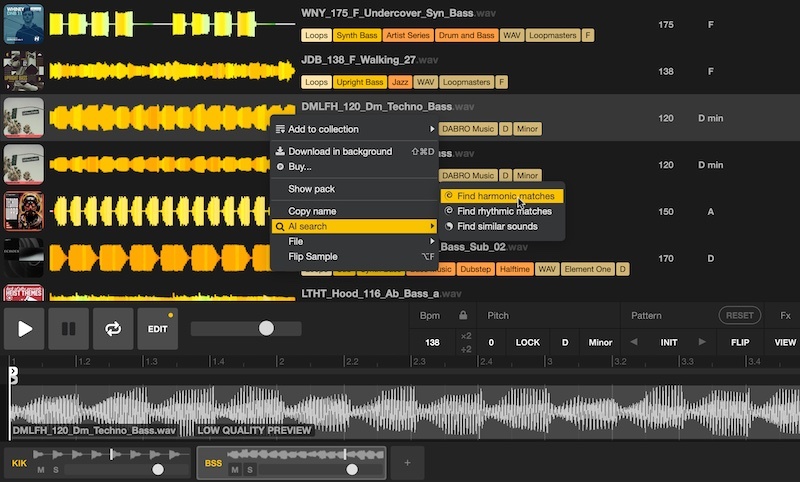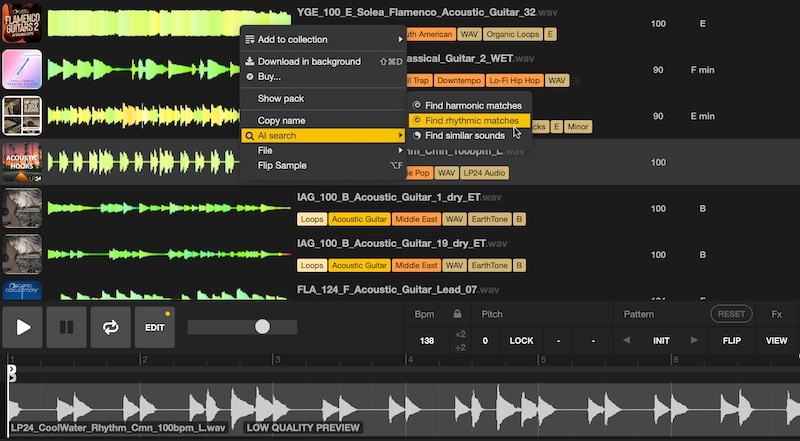Blog
5 Ways you Should be Using AI Search to Find Samples
30 Oct '2025
Discover when you can up your game with a little help from Loopcloud’s smart assistance features

Cover Image: cottonbro studio
AI is changing the way we create music in so many ways, but in most cases those changes aren’t wholesale. Instead, the best AI tools have found their success by making parts of music production more efficient, quicker or higher quality – not simply by doing it all for us.
Case in point: the AI tools found in Loopcloud. These don’t overreach and take over your workflow, in fact they’re reasonably tucked away in a right-click menu in most cases. But when the right moment comes, they can really improve the way you make music.
In this article, we’ll tell you exactly when those moments are, and give you some insight into when you should be checking out Loopcloud’s AI sample finding capabilities in your session.
How does AI search work in Loopcloud?
This functionality lets you find samples, but instead of searching using tags, categories or keywords, you search by using a sound as the ‘prompt’. The Loopcloud desktop app has three options for finding new samples, and the Loopcloud Sounds plugin has one: Find Similar Sounds.
This searches for sounds in the Loopcloud store that bare a similarity to the currently selected sound, with a view to replacing it. It’s a great tool for getting variations on a sound, which has a few good uses.

The Loopcloud desktop app also lets you Find Similar Sounds, but it also lets you find ‘matches’ for a loop sample. By searching for a Rhythmic Match, you get a loop that fits well with the timing and swing of your selected sample, meaning they could work more easily when layered. With the power of the Harmonic Match, you can match key and chords, often helping you to find some unexpected combinations.
1. Get inspiration to kick off a whole track
Some producers have a set way of starting off tracks: many start with the kick, while others opt to put some great MIDI together and start with a melody, hook or bassline.
However you start, using an AI sample search is a great way to quickly move into a different direction, avoiding doing the exact same thing you do every other time.
Let’s say you start with a kick and then find a bassline you like. Try right-clicking the bassline and selecting Find Harmonic Matches.

Once you’ve done this, you know you’re locked in with your bassline, harmonically. You can now filter for instrument categories, and find something that works.
2. Really lock in a groove
Let’s talk about another superpower of AI search: Rhythmic Matching.
With this feature, you can search through our four million samples with one thing in mind specifically: groove. Loopcloud’s AI search will analyze the timing of your selected sample – not just the tempo, but the swing and the feel – and show you only samples that match with that, whatever they are.

This is a great way to get two sounds that really groove together. That could be keys and a bassline, or perhaps drums and an acoustic guitar, or an orchestral loop with percussion. Again, you can let the search functions surprise you, or hone in on something specific.
3. Find two sounds that shouldn’t work together, but do
When using any AI search, but especially when telling Loopcloud to Find Harmonic Matches, we’ve so far been recommending you go forward by selecting a category of instrument to match your analyzed sample with.
“Who knew that bamboo flute loop would have been such a good match for your Techno bassline?”
However, the power of harmonic matching also lies in being pleasantly surprised by how well two samples work together, when you never would have even tried them together. Who knew that bamboo flute loop would have been such a good match for your Techno bassline?
The secret lies in the analysis. It’s true that every tonal loop in Loopcloud has is searchable by its key, and two samples that have the same key should work together, but sometimes even different musical keys share enough notes to butt up against each other in a very nice-sounding way. It’s another case of AI solving a problem in a different way.
4. Replace a sample you don’t have the rights for
It’s not just samples in the Loopcloud store – the user folders that you’ve added to Loopcloud can have harmonic analysis performed on them as well. This means that you can take any sample on your computer, and see what Loopcloud can offer to complement it – or replace it.
This can come in especially handy for last-minute changes. Let’s say you’ve got a track signed to a label, but they say you’ve got to replace any samples you don’t own the rights to – a good idea even to begin with. So how can you find a royalty-free sample that’s got a sound and a vibe just like your old one? Loopcloud’s Find Similar Sounds, of course!
5. Reinvigorate a lost session
Not every project hits the target every time. Have you ever been working on a complete clanger, and decided that it’s time for it to reach the only place it deserves to be? The bin.
With AI search and Find Similar Sounds, you actually get one last chance to save that session before it ends up in the trash. First, take some of your samples – whether they’re available in Loopcloud or imported into your user folder – and attempt replacing them with similar versions to start renovating that tune.
Next, or as an alternative, try stripping back your tune to only three elements, render the result to a stereo mixdown, and ensure it’s available in your Loopcloud user library. Take this ‘sample’ and use it to Find Harmonic Matches and to Find Rhythmic Matches. Using your existing music as its ‘prompt’, Loopcloud will suggest some new directions for you to build back better.
Get searching with Loopcloud
Our AI search features work best when using the Loopcloud desktop app or Loopcloud Sounds. Get started with either when you sign up for Loopcloud. There’s often a free trial offer running, so you can usually try it out for free!

